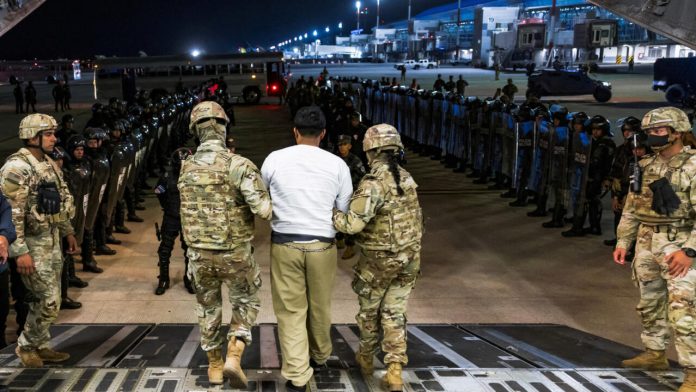The US Supreme Court has temporarily stopped the deportation of Venezuelan nationals detained in northern Texas. The case involves the use of the Alien Enemies Act, a law from 1798 that was originally passed for wartime.
In a brief order, the Court told the Trump administration not to deport detainees held at the Bluebonnet Detention Centre. This pause will remain in effect until the Court makes a further decision. Justices Clarence Thomas and Samuel Alito disagreed with the ruling.
The American Civil Liberties Union (ACLU) raised the issue in court. They argued that immigration authorities were trying to use a historic law to fast-track deportations without due process.
ACLU challenges use of wartime legislation
The ACLU said they felt relieved by the Court’s decision. They warned that some individuals faced a lifetime in dangerous prison conditions. These deportations, they argued, were happening without fair legal hearings.
In April, the Supreme Court ruled that deportations could only happen if the person involved had a fair chance to challenge the decision. The process must also allow time to present a case in court.
Despite this, two federal judges refused to stop the removals last Friday. The 5th US Circuit Court of Appeals also declined to issue a protective order.
The ACLU had already filed a lawsuit to stop the deportation of two Venezuelans. They later asked the court to stop the use of the Alien Enemies Act for any detainees in the region.
Immigration officers claimed some men at Bluebonnet were part of the Tren de Aragua gang. This label would make them targets for removal under the 1798 law.
Court orders vary across the United States
US officials have rarely used the Alien Enemies Act. The last major use was during World War II, when the government placed Japanese-American civilians in internment camps.
The Trump administration believes the law gives them power to deport suspected gang members quickly, regardless of immigration status.
Earlier this month, courts in Colorado, New York, and southern Texas blocked deportations. They told the government to give detainees a chance to fight their cases in court. However, no similar order covered the Bluebonnet facility, located north of Abilene, Texas.
Judge James Wesley Hendrix, a Trump appointee, refused to ban all deportations from the area. He noted that the two men named in the lawsuit were not facing immediate removal. He also said that broader action wasn’t needed yet because large-scale deportations hadn’t started.
Lawyers report pressure and secret transfers
The ACLU presented sworn statements from several immigration lawyers. They said their clients received documents identifying them as gang members. These individuals were told they could be deported as early as Saturday.
One lawyer, Karene Brown, said her client was forced to sign papers in English, even though he only spoke Spanish. She claimed officials told him he would be deported whether he signed or not.
ACLU lawyer Lee Gelernt told a Washington, DC court that officials had moved Venezuelan detainees between facilities. He said the administration avoided areas with court blocks by sending people to Bluebonnet.
Witnesses said detainees were put on buses last Friday night. They believed the men were on their way to the airport.
Thanks to the Supreme Court’s temporary order, these deportations are now on hold while the legal battle continues.
